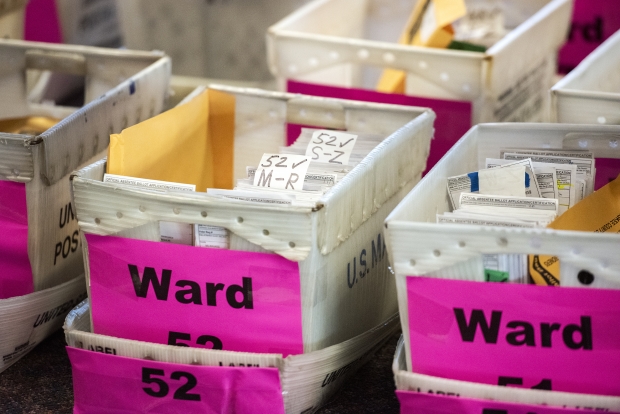Judge Says Absentee Ballots With Incomplete Addresses Can Be Counted
Supreme Court appeal expected, ruling centers on incomplete witness addresses.

Absentee ballots are stored in box Tuesday, Nov. 3, 2020, at Milwaukee’s Central Count facility. Angela Major/WPR
A Dane County judge has ruled that clerks can count absentee ballots with missing witness address information, a decision that conflicts with a 2022 ruling out of Waukesha County that could set up an appeal to the Wisconsin Supreme Court.
On Tuesday, Dane County Circuit Court Judge Ryan Nilsestuen issued two rulings related to witness addresses on absentee ballot envelopes that could result in more ballots being counted. State law requires absentee voter witnesses to sign ballot envelopes, known as certificates, and include their address. But what constitutes an address has been litigated multiple times in recent years.
In one case, Nilsestuen sided with the League of Women Voters, ruling that rejecting absentee ballots due to incomplete witness address information on ballot envelopes violates the federal Civil Rights Act of 1964.
Nilsestuen cited language in the Act that states, “No person acting under color of law shall — deny the right of any individual to vote in any election because of an error or omission on any record or paper” relating to voting registration, application required to vote “if such an error or omission is not material in determining whether such individual is qualified under State law to vote in such election.”
Nilsestuen said federal law does allow Wisconsin absentee ballots to be rejected if a voter fails to sign a ballot certificate envelope, but not for “trivial defects, such as a missing ZIP code for the witness’s address.”
“After all, a witness’s address says nothing about the voter’s citizenship, age, or residency,” Nilsestuen said. “Nor does it say anything about whether the voter has been disenfranchised due to a felony conviction or adjudicated incompetent to vote. The address is simply not material to determining the eligibility of a voter.”
In another case, he sided with the youth organizing group Rise, Inc., ruling that the definition of a witness address should mean “a place where the witness can be communicated with.”
In his Rise ruling, Nilsestuen said the “problem at hand could be resolved if the Legislature passed a bill to define ‘address.'”
“Instead, it is up to the judiciary to make sense of an undefined word used in a variety of different contexts in a convoluted and poorly written statute,” Nilsestuen said.
Nilsestuen previously served as chief legal counsel to Democratic Gov. Tony Evers, who appointed him to the court in 2022.
Tuesday’s rulings were the latest in a years-long dispute over absentee ballots in Wisconsin
Absentee ballots, and witness address information in particular, have been the subject of several lawsuits in Wisconsin.
In 2016, the Wisconsin Elections Commission unanimously approved guidance to clerks stating that a witness address “contain at a minimum, a street number, street name and municipality for the certificate to be considered sufficient.”
That guidance was used by clerks without issue, said Nilsestuen, until after 2020. That’s when former President Donald Trump attempted to reverse his loss in Wisconsin to President Joe Biden in a lawsuit before the Wisconsin Supreme Court.
In a 4-3 majority opinion written by conservative swing Justice Brian Hagedorn and joined by the court’s three liberals, the court rejected the Trump campaign’s suit because it was filed after the election. Hagedorn’s opinion noted state law isn’t clear on what constitutes an address on an absentee ballot but left the question unresolved.
“While the world has surely faced more pressing questions, the contours of what makes an address an address has real impact,” Hagedorn wrote in his Dec. 14, 2020 opinion. “Would a street address be enough, but no municipality? Is the state necessary? Zip code too? Does it matter if the witness uses their mailing address and not the residential address (which can be different)?”
In September 2022, Waukesha County Circuit Court Judge Michael Aprahamian ruled that clerks cannot fill in missing witness address information on absentee ballot envelopes under state law and those ballots must be rejected.
Attorney Jon Sherman of the Fair Elections Center, who represented the League of Women Voters in the case decided Tuesday, told WPR the 2022 Waukesha County ruling made Wisconsin an outlier.
“Here we’re talking about components of the witness’s address, details like the zip code,” Sherman said. “It’s really the only case of its kind that I can think of out there where there’s been a hard and fast rule to reject a ballot based on a missing detail in the witness’ information on the absentee ballot.”
Dane County Clerk Scott McDonell told WPR that despite the recent ruling, there still “isn’t enough clarity” on how election workers should approach witness addresses. McDonnell said he hopes the state Supreme Court can eventually set a statewide standard.
“What you don’t want is, if you’re doing a recount, for example, over multiple counties and one or two counties are following one approach and another is following another approach. That’s not fair to the candidates,” McDonell said.
Nilsestuen’s decision in the League of Women Voters case states that 2,239 absentee ballots were rejected in the November 2022 election due to “insufficient certifications.”
An attorney representing the Republican-controlled State Legislature declined to comment on Nilsestuen’s rulings.
Listen to the WPR report here.
Dane County judge rules absentee ballots with incomplete witness addresses can be counted was originally published by Wisconsin Public Radio.





















